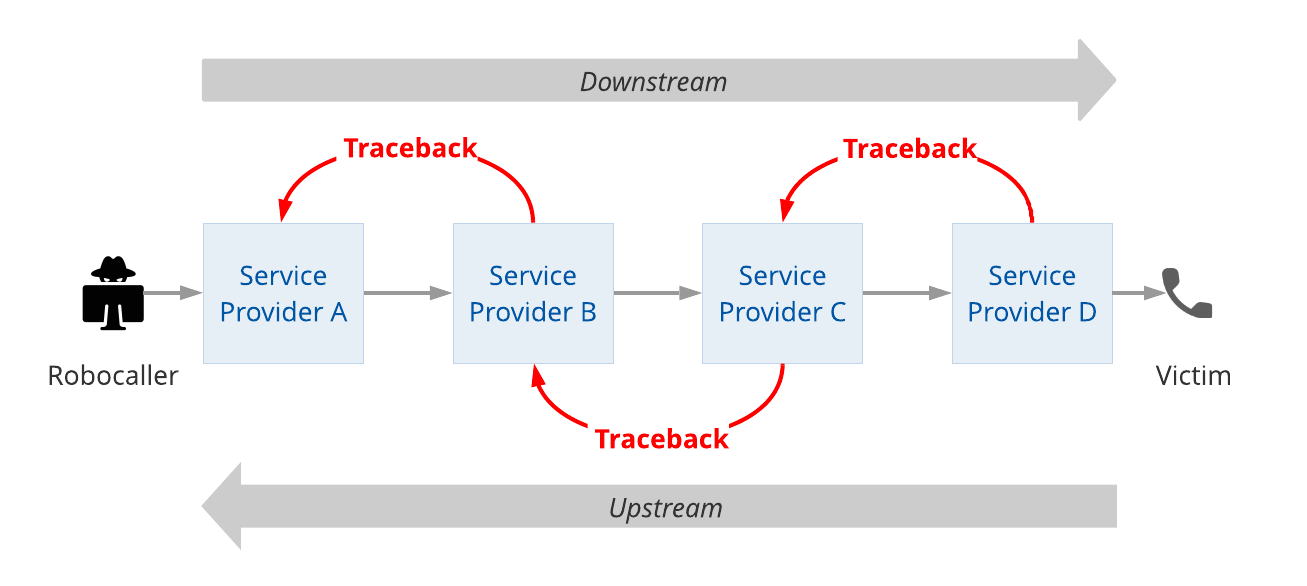Robocall traceback in the U.S.
The USTelecom Industry Traceback Group (ITG) has become increasingly effective in speeding up the traceback of illegal robocalls. Ever wonder how it works? Here’s an overview.
The traceback process
The traceback process often begins with the terminating service provider (TSP), which becomes aware of robocall activity either from customer complaints or call analytics. The TSP contacts the ITG to launch a traceback.
The ITG begins a traceback case using the Secure Traceback Portal (STP), an online portal it maintains to collect traceback information. The ITG sends an email to the first provider with a link to the case in the STP.
The provider uses the STP portal to enter incident data for the calls, including:
- Originating telephone number
- Originating IP address
- Called telephone number
- Called IP address
- A description of SIP header anomalies
- Evidence of caller ID, ANI, telephone number spoofing
- Volume of calls, including Call Detail Record (CDR) information
- Date and time of calls
- The next upstream provider from which this provider received the calls.
Each provider adds information to the case

If the next upstream provider has previously participated in a traceback case, then its contact information will be available in the STP. If the next upstream provider has never participated in a case, then the downstream provider should provide contact details so that the STP can be updated.
With this information collected, the ITG sends an email to the next upstream provider. This email to the next provider includes a link to the STP case. This provider supplies information, including the next upstream provider from which they received the calls.
The traceback process is repeated until the originating service provider is identified, the U.S. point of entry is identified, or a dead end is reached.

Non-cooperative voice service provider
A voice service provider is deemed non-cooperative if it does not follow ITG best practices and/or does not cooperate with traceback efforts. Specific non-cooperative actions include:
- Non-responsive. A voice service provider does not respond to traceback requests.
- Ongoing illegal origination. A voice service provider that placed the calls itself or received calls from its customer.
- U.S. point of entry. Gateway provider that brought a call originating abroad onto the U.S. PSTN.
- Not found. A voice service provider that repeatedly responds to traceback requests with “not found,” i.e., they claim they cannot help with the request because they cannot find any information about the call.
When a service provider has been identified as non-cooperative, it will receive an email from the ITG with a message relevant to their actions. If they are non-responsive, they are asked to respond. If they are originating illegal calls or are the U.S. point of entry for illegal calls, they are asked to stop sending such call traffic. Sample emails for each of these scenarios are provided in the ITG Policies and Procedures Manual.
If a provider continues to be non-responsive, it will receive escalation emails. If it still non-cooperative, the ITG can get the FCC or FTC involved. This process is called a traceback handoff.
After further investigation, the FCC can direct other carriers that participate with the ITG to stop accepting call traffic from a non-cooperating provider. This happened in April 2020 and May 2020, for example.
Trace forward
Some robocall scams provide a callback number. With the trace forward process, the ITG contacts the service provider that owns the DID number and requests information about the customer the number is associated with, including:
- Name
- Contact information
- Payment information
TransNexus robocall mitigaiton solutions
We offer robocall mitigation solutions in our ClearIP and NexOSS software products. Contact us today to learn how we can help you prevent nuisance and scam robocalls from originating in or entering your network.
TransNexus has a comprehensive suite of robocall mitigation solutions to prevent the origination of unlawful robocalls.
Learn more about robocall mitigation